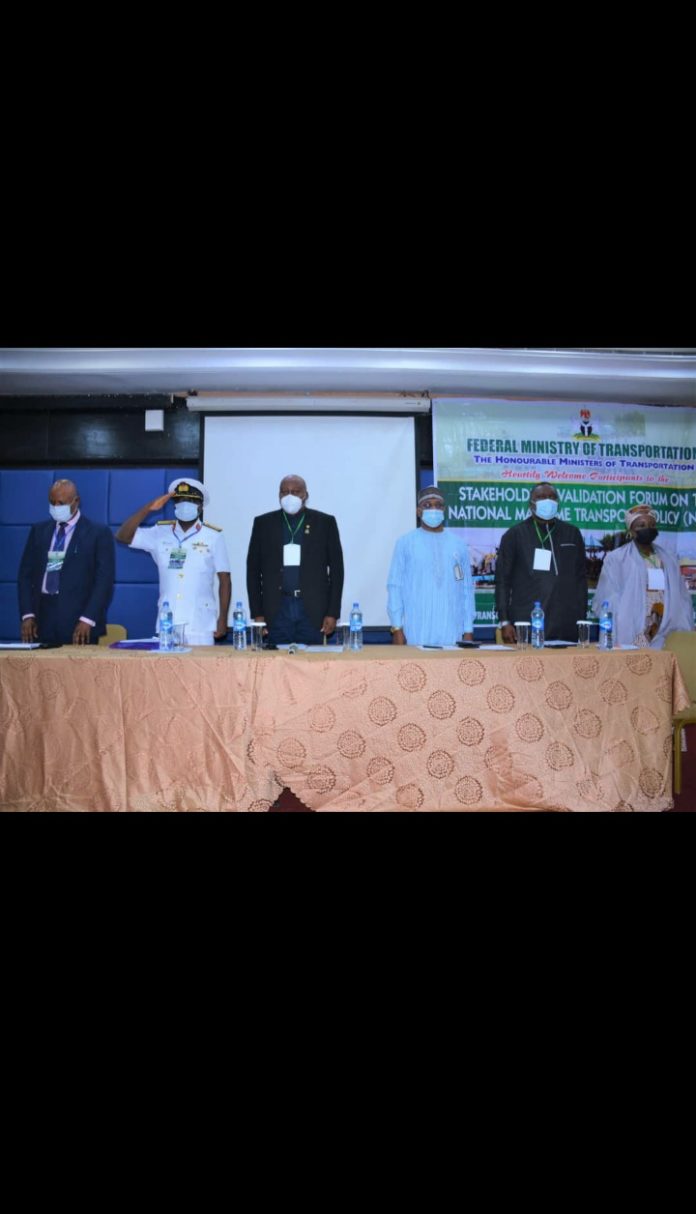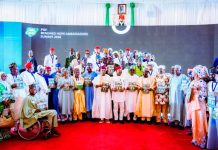The Minister of State for Transportation, Sen. Gbemisola Ruqayyah Saraki, has said that a well articulated National Maritime Transport Policy will position Nigeria to compete favourably in the global market as well as make substantial contributions to the economic development of the country.
Sen. Saraki, who disclosed this today in Calabar at Stakeholders’ Validation Forum to review the draft policy document on National Maritme Transport Policy for the Eastern leg, acknowledged that the views of all stakeholders’ in the maritime sector is highly needed in order to produce a document that will serve as an implementation tool towards fostering sustainable growth and development of the maritime sector and the country at large.
The Minister of State for Transportation who was represented by the Rector, Maritime Academy of Nigeria, Oron, Air Commodore, Emmanuel Effedua (rtd), further challenged major actors in the sector saying: “We should strive for sustainable solutions that will further offer unique opportunities aimed at charting the desired synergy, collaboration and connective interplay in the sector for maximum economic benefit to the maritime sector, the national economy and consequently raise the profile of the sector globally”.
Saraki also pointed out that a maritime policy in sync with current realties will promote job creation, revenue generation, foreign exchange earnings and entrepreneurial skills for Nigeria’s growing economy.
Speaking earlier, the Permanent Secretary, Federal Ministry of Transportation, Dr. Magdalene Ajani, who was also represented by the Director, Maritime Safety and Security, Dr. Paul Adalikwu, noted that “policy is the bedrock for the development of any nation and sector. Therefore the development of the National Maritime Transport Policy is pivotal to the survival, sustainability and advancement of the Maritime Sector of Nigeria.”
Ajani, further charged the selected policy makers and players in the Maritime industry to bring to bear their inputs and experiences into the policy document so it can be submitted for vetting and approval by the Federal Executive Council.
The Chairman, Technical Committee of the National Maritime Transport Policy and Director, Maritime Safety and Security, Federal Ministry of Transportation, Dr. Paul Adalikwu, by way of a reminder, stated that the Maritime Sub-Sector lacks the most essential facility needed for acceptable planning, projections, strategizing and implementation: these and more, he added has diminished the ability of key players to make substantive impact in the national and global economy.
Also, Captain Iheanacho Ebubeogu of the Nigerian Chamber of Shipping, in brief, informed that the National Maritime Transport Policy was first drafted in 2016 but never fully implemented and hoped the forum provides the needed platform to proffer inputs that are not only self seeking for the country but are in tandem with implementation and enforcement of International Maritime Organisation (IMO) instruments.
It would be recalled that the first leg of the validation of the draft policy (Western region) took place in Lagos, January 28, 2021.
Those in attendance at the Stakeholders’ validation forum were: representatives of the Federal Ministry of Finance, the Zonal Head, South/South and South-East, Council for the Regulation of Freight Forwarding in Nigeria, Uwalaka Ambrose, the Area Comptroller, Nigerian Customs Service, Calabar, Director Audit, Naval Headquarters, Nigerian Navy, Emmanuel Ogalla, also from the Nigerian Navy was Commodore Abdulrahman Mohammed of the Naval Eastern Command, Office of the National Security Adviser and representative of the National Security Adviser, Commodore Adefemi Kayode, Association of Nigerian Licensed Customs Agents, Management staff of the Ministry, among others.
Eric Ojiekwe
Director, Press & PR
April 19, 2021





